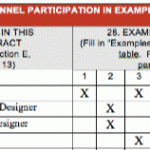
Honesty in the proposal business is a slippery slope. Sure, we all tell the truth in our proposals. Don’t we? But think about how ripe the whole process is for dishonesty.
I think we all have a relationship with honesty and the proposal game. I think I’ve told this story before, but I remember the moment a marketing coordinator who worked for me realized that not all proposal competitions were fair. I could almost hear her heart sink in her chest. And frankly, I felt really bad and I wish we lived in a world where all proposal competitions were fair. But that’s simply not the world we live in.
Let’s face it, whenever you are taking actions to give yourself an unfair advantage over your competition…that’s dishonest.
In our industry, “pre selling the job” is seen as an essential tactic. Heck, SMPS promotes things like pre selling the job, developing a relationship with the client to sway things your way, etc. But these actions are tipping the scales in our favor, they are cheating. Cheating is dishonest, right?
And that’s just before we start working on the proposal. There is so much dishonest behavior you can rationalize during the proposal development process. Let’s bid the scope of work and just ask for a change order later. Here is the rationalization: that’s what we need to do to be competitive. That’s what the competition will do.
The video above discusses new research on dishonesty. It comes to the conclusion that most of us behave just a little bit dishonestly, but rationalize our actions because they benefit us. If you have a few minutes, check it out and ask yourself how honest you really are.
If you liked this article, please subscribe below. If you want to give us your thoughts on this issue, please leave a comment below.





Hi Matt,
Perhaps I’m misunderstanding something, but are you saying that selling before the proposal is cheating? When then is selling not cheating? I’ve long viewed sales calls as an opportunity to serve the client, and I’ve found that relationships tend to form when you help people. Does this give me an edge when the proposal follows? In most cases, that’s been my experience. Does that make me dishonest?
I would be more inclined to question the motives of those firms that don’t engage the client before the proposal. They show little interest in helping the client until the RFP is released. Now they’re in the position of trying to convey in their proposal that they care about the client, despite their absence previously. Many clients interpret this kind of behavior as self-serving opportunism, and I would tend to agree. But do you think these firms demonstrate more honesty?
Mel,
I’m honored to have one of the bloggers I read…read my blog. Thank you.
What you point out is exactly what I want to get people thinking about.
The intention of the whole proposal process is to help buyers make the best choice by presenting a fair competition among vendors. But our job is to get the client to make the choices we want them to make (i.e. hire us). Our job, if done properly, is to beat the system (by any means necessary).
What if we were both in a beauty contest. However, I had developed “relationships” with some of the female judges and found out what they are attracted to. When it came time for our swimsuit competition, I wore the swim trunks that drove them wild.
Most people will agree this type of behavior is cheating in a beauty contest. In fact, you’d not only be angry at me. I think you would be disgusted at those judges for allowing me to do that.
But in a proposal competition, we’re doing the clients a favor. As you allude to, it’s unwise not to “pre-sell the job.”
Why do we view proposal competitions (sometimes for millions in public funds) with a different moral obligation than beauty contests?
I think the video helps explain this. When we are to benefit, we rationalize this behavior.
The point I’m making is…hey folks, the job we do is in a moral grey area. Let’s just accept that.
But remember in a beauty contest there are various stages of the competition with the field being progressively narrowed. The proposal is only one stage of the process. If your theoretical contestant wows the judges in the swimsuit competition (and not because of cultivating some kind of favoritism) does that bias the judging of the talent portion? Undoubtedly, it’s an incremental process. Impressions made in the earlier stages of the competition are bound to color assessments made later in the process.
So it is with proposals. Clients already have impressions of the contestants before the RFP is released. They review those proposals with those impressions as a frame of reference. The formal procurement process may not acknowledge those impressions (or relationships), but they are a powerful force in the selection. That’s human nature, and I embrace the human element of the selection process.
Perhaps the most dishonest aspect of the formal A/E procurement process is this perpetuated myth that it’s totally objective and qualifications based. It’s not, nor would I want it to be. Clients should choose the firm they believe can best meet their needs. And that includes assessing the human dimensions of the transaction (e.g., trust, commitment, responsiveness, compatibility, service) that cannot be fully accounted in the formal process. Responding to those needs isn’t cheating; it’s being client centered.
Mel,
I’m not throwing stones at anyone here. I agree with what you are saying.
Whether or not the current norm is in anyone’s best interest is irrelevant.
Like you said, there is a “perpetuated myth that it’s totally objective.” But the intention of the process was for it to be totally objective.
But as you point out, human nature gets in the way. That’s the point the video makes.
I think we can agree that not every vendor gets the same probability of win because the competition is not totally objective and qualifications based.
And any competition where every player doesn’t start with the same probability of win, is fundamentally unfair.
We can rationalize it all we want. Yes, it’s in the client’s best interest. It may even be in the tax payer’s best interest.
However, the clients and their vendors are taking action to create a competitive environment that is not totally objective and qualifications based. You or I don’t consider that dishonest in any way. However, I believe Mother Theresa would consider those actions dishonest.
Matt, I agree with you. I think it’s important for us to be honest about dishonesty. I think that the system makes it easier for larger firms to be competitive and tougher for smaller firms who simply can’t afford either seasoned business development professionals or for their principals to function as 80/20 closer/doers. I further greatly respect you for your willingness to publicly call a spade a spade. Very rare in our profession.
Hi Matt,
Interesting question – it can certainly be looked at from both angles..
You say ‘any competition where every player doesn’t start with the same probability of win, is fundamentally unfair’ but I would have to disagree with that..
If you’ll excuse my Britishness, I’ll compare it to a hypothetical football cup competition. In the final we have Chelsea vs. Bradford… Chelsea have breezed their way there and are by far the favourites to win. Bradford have done amazing to get this far with a monumental David vs Goliath-esque effort; but are thoroughly likely to get slaughtered by the dominant Chelsea.
The teams do not share the same probability of a win – but is this unfair? Bradford’s squad costs about £5m – Chelsea’s about £150m; is this unfair?
Quite simply, no – they are both businesses, one is more successful than the other; this did not happen by accident.
If my company is better than the competition, either in terms of ‘qualifications based’ superiority or simply in managing to maintain a better relationship with the client; am I dishonest, or to blame if we trounce the opposition?
And similarly, if Bradford go in the underdogs but with the exact right tactics and end up winning the game, then are they to blame? Hells no! All is fair in love and football.. and bidding..
What would be dishonest is bribing the referee; ie deliberately breaking the parameters of the bidding process; I understand that what you are doing is questioning the level of honesty the bidding process allows, but I think (although its not as black and white as this all of the time) as long as you are not breaking the rules, you’re not being dishonest.
Excuse this rambling analogy!
Jack,
Thank you for commenting.
In this country we have a saying for american football. “Any team can be beat on any given Sunday.” Both teams walk onto the field with no advantage other than the quality of their team. May the best team win.
That’s the intention of the A/E procurement process. May the most qualified/best value team win. It’s the government’s obligation to obtain the best value for the tax payers. I could also argue that it’s the corporation’s obligation to obtain the best value on behalf of the shareholders.
We can rationalize it until, as we say, the cows come home. But I think Mother Theresa, if she were alive, would say the Chelsea vs. Bradford match will be conducted fairly.
But if she were to oversee the procurement process of many A/E contracts, would she feel the same?
My point is a lot like what Mel was alluding to. (check out his site at http://www.blog-bizedge.biz ). Don’t walk into any proposal competition thinking you are walking onto a fair playing field. Don’t assume the most qualified team will win. Accept the fact that we are active participants in a procurement process that is fundamentally flawed with highly-questionable fairness.
Mel and I know this because we’ve been around for a while. But the majority of people who work on proposals in the A/E world are younger than us. The less experienced readers may not know this. Proposal development is a young person’s game because it is grueling, stressful work.
Your job in the proposal world is to put your team’s “best foot forward.” Be truthful, don’t break the law (bribe,etc.), but always put your firm’s best foot forward. Understand the game you are playing.
Good morning, Matt –
I resent the implication that being competitive is the same as cheating. We (most of us, anyway) define cheating as dishonest and unfair. But there is nothing intrinsically dishonest about choosing to visit a prospective client to make him/her aware of your firm’s capabilities and how you can help them achieve their own goals. There are many marketers who are scrupulously honest in their discussions with potential clients, and many clients who are smart enough to see through the BS when that is what they are presented.
If building a relationship with a prospective client through the exchange of honest and accurate information is truly cheating, then honesty would require that all firms get rid of their marketing staff and just wait for clients to come to them. The fact is that many final selections are based on the relationship one develops with a potential client. If a client selects my firm because we have a relationship, it is not unfair. It simply means that the consultant who is not selected made a wrong decision when he/she chose to spend time building a relationship with some other prospective client. This doesn’t mean that I cheated. It simply means someone else made the wrong choice.
Bernie,
You know you are probably the last person on this earth I would want to upset or speak ill of. I have a great amount of respect for you.
In general, I agree with what you are saying. Introducing yourself to the client and learning about their needs is not only fair, it is smart. That was what Mel was saying and I completely agree.
I wouldn’t necessarily consider that “pre-selling the job.” I would consider pre-selling the job convincing the client to sole source it to you and use the procurement process as a formality. I would consider leveraging your relationship with a congressman to get a job suspect behavior. Buying the client dinner and pitching your firm for a specific job, while commonplace, could be considered another example.
I’m not telling you not to do these things. I’ve certainly paid for a client’s dinner before.
But I mention other examples, like bidding the scope with the intention of submitting change orders later. We know that happens all the time. When you look at it from a very strict perspective, it’s dishonest.
At least under this country’s Federal Acquisition Regulations, procurements must be conducted with integrity, fairness, and openness. I’m sure some are. I hope the majority are. But you and I know some aren’t. I know you wrote the book on Federal procurements, so I don’t have to get into that.
Please watch the video if you haven’t already. Nobody is saying we are bad people. We are humans and we behave as such.
Thank you for joining the conversation.
Matt –
So I guess under this premise, trade shows are a form of cheating.
If we wanted to go even further, if my company has a different type of software or service that makes us better, that’s cheating.
If my company hired an expert in our field, that’s being dishonest.
Where does it end? When we are all a bunch of faceless corporations that are the same? How does that best serve a client or the consumer?
I understand that you are just raising the question to engage discussion, and I’m definitely not advocating dishonest relationships… but what makes our system of capitalism great is that we are trying to always beat out our competitors by “building a better mouse trap.” It is what has propelled us forward in so many positive ways. Otherwise we are stagnant. We must embrace competition again in this country, not be content in giving everyone the same worthless medals for participation.
And Gina, these large firms didn’t just pop into existence from out of nothing. These firms took the time, performed the effort and made the financial investment to grow by winning. If your firm isn’t doing that, you have to look inward and plan and do what is needed to be come successful. Don’t blame others for your firm’s lack of success. Fix it! Reduce the number of proposals you are going after by figuring out what makes you most successful and go and develop ethical and true relationships with the clients you want to have.
I don’t work at large, dominating firm either. Sometimes we get beat by smaller firms than ours! Sure it’s frustrating at times to get beat by anyone, but that just is a professional and personal challenge I accept and relish. There is not one industry and profession in which mediocrity is celebrated. Competition just makes us all better.
Aaron,
Thank you for commenting.
I fear you are misinterpreting the conversation. Please read my responses to comments to get further clarification.
Mark,
An interesting article and food for thought, especially in the comments. At first I thought the article was all about outright lying in tenders, but then you started giving examples in the comments that I (and others, it seems) just can’t accept as cheating.
For me (and you seem to agree), cheating is about giving yourself an unfair advantage over others through dishonest or underhand means. If I take a client out to lunch and that swings me the contract, well didn’t my competitors also have a chance to take him out for lunch? If they didn’t it’s probably because they were focusing on another client at the time, their choice and nothing I did.
Realistically, one lunch is not going to swing it. It will be based on a longer term relationship. So if we both take the time to build a relationship with the client, and she chooses me, then that will be because she’s realised in our conversations that my company can fulfil the brief better than my competitor. And that’s a fair reason to win a contract, right?
In general if a client we have a relationship with accepts our tender, it’s because we have impressed them with our previous work. Again, the tender is really accepted because we are the best company. If I work with a client and screw up, that relationship is hardly going to help me. Taking someone out for dinner is not enough to get you further work.
True examples of cheating for me would be when someone lies outright in a tender and says they will do something they have no intention of doing. Pruning out our mistakes and focusing only on our strengths in a tender is not cheating, the purpose of it is to sell ourselves – and unless we’ve learned from our mistakes and changed our ways, how much longer are we going to be in business anyway? Likewise if we consistently fail to deliver on what we promised in a tender, our reputation will be shot and our tenders will stop being accepted.
There’s an inherent part of tendering that means all parties enter on a relatively even playing field. The jobs we’re tendering for will have a certain value that only a certain tier of companies can bid for. I won’t be bidding for a £50m contract with a company that has three employees and no time for marketing or networking. We will all have been in business for a certain length of time, have already carried out a similar number and range of projects, have the same budget for wining and dining employees.
So this is not entirely defensive – Mark, what alternative procedures can you suggest to make it more fair?
Thank you for the interesting article.
Gemma,
I think you mean “Matt.” Mark is one of the commenters. :p
You folks are getting hung up on the dinner example. Yes, it’s highly unlikely that one dinner will get you the job. I agree.
However, in public procurement, government officials are not supposed to accept gifts. Buying an official, let’s say, $100 in food and drinks is a good example of a grey area. Is that a gift?
I think it’s a grey area. I know of officials who will not share a cab with you and others who you can rent a limo for. I’m sure you do too.
In my humble opinion, this is too hard to police. It would be extremely difficult to reform the system and ensure compliance. As I believe Mel alluded to, human nature makes it almost impossible for the system to be 100% fair and square. Check out my “What You Don’t Know About Marketing” post for more info on that.
We’re talking about the many consultants and clients who, “bend the rules.” Bending the rules is tough to catch and even tougher to punish.
As my friend Wally Zimolong has covered on his blog, the authorities have their hands full with our industry already.
They’ll probably never go after you for taking a government official to a $100 dinner (although I should never say never).
The video I posted makes the case that those who “bend the rules” ultimately do more damage than those who are get caught breaking them.
One guy sent me a terrific example, he was directed to put the resume of someone who just died into a proposal. That’s one dramatic example, but I wonder how many proposals contain the resumes of people who are too busy to work on the proposed project? Is that putting your best foot forward or dishonest? It would be hard to find a rule doing that would break. And if you are directed to do this, is it really your decision or someone else’s?
I’m not, at least in this case, telling you what to do or what not to do. You need to decide what you are comfortable with doing. I won’t judge you. 🙂
I’m just bringing up a point. The point being, “Hey, this business you are in is a little bit shady…accept that.” Know what you are walking into.
As a note, I sometimes get comments that the tactics I promote are manipulative. I know people who feel uncomfortable with the tactics I advise people to use. That’s OK, because everybody has their own comfort level.
Apologies for getting your name wrong Matt, there is one mistake not to make with a client 🙂
Perhaps you’re right about us getting hung up on the dinner example. That is something that every organisation does so I’m sure that’s why we all thought hardest about that one.
Including a dead person’s CV, or someone who is not going to be on the project team? Yes, I’d call that cheating. If your tender is accepted on the strength of your proposed team, and you have no intention of producing that team for them, that’s certainly dishonest and unfair. I don’t have that kind of decision making power but I would object as strongly as I could if I was asked to do that – although the company I work for would never ask me to in the first place.
One thing I also noticed is that you’re talking about doing these things while the tender is in progress. My company wouldn’t even have a client dinner in those times, in fact I recently moved a meeting with an employee at a company we were tendering for – even though the employee was not involved in the tender. There can be no accusations of backhand deals going on. I thought you were talking about tendering with a company you have a relationship with pre-tender, I couldn’t understand why it would be cheating to tender with a client you have been networking with for years. It seems I misunderstood.
Isn’t it nice when you discover you agree with someone after all?
I think it was Peter Drucker who said if everybody agrees…there is something you haven’t thought of. 🙂
I love getting comments from extremely intelligent people like Mel and Bernie (and I’m sure you and the others). Debating with these kinds of people help me develop clearer views. I want to know when I’m missing an important point or am just plain wrong. 🙂
So, if we were to boil this entire article and discussion down, it would look something like this (in my estimation):
1) Relationships influence ALL business.
2) If you don’t use relationships to your advantage, you’re an idiot (and will soon be a loser in the bidding process).
3) Business relationships do NOT equal cheating or dishonesty.
4) As you build these business relationships, be smart and observe the governing rules.
Have I got the gist of it?
Todd,
Thank you for commenting. I think fully addressing your comment would take us down a rabbit hole that is not really appropriate and cannot be fully addressed in the comments section.
The term “relationships” always throws me for a loop. Bernie, who commented on this post, said something to me a few years back. It went something like this.
“I have relationships with many people, but that doesn’t mean I would hire them.”
I consider what I have with Bernie a business “relationship.” When I was writing a book about proposals, he was probably the first person I asked to comment on it. And I changed the book a lot because of his thoughts and the trust I have in him. If I needed help with anything regarding proposals, I wouldn’t hesitate to hire him.
Would I let him perform brain surgery on me? No. I doubt he’s ever performed surgery on anyone.
So, do “relationships” influence all business? No, it’s something much more specific.
It’s not my relationship, per say, that would influence my decision to hire Bernie to help me with a proposal? It’s more that I like him, know his abilities, and have confidence in his knowledge on the subject. Plus, I owe him a favor or three.
The term “relationship” is way too broad to use when talking about something like influencing decisions.
So, it’s impossible for me agree or disagree with your statements because they are not specific enough. I’m sorry if that is frustrating.
I suggest you check out these articles I wrote on the topics of relationships and influence:
http://helpeverybody.wpengine.com/proposal-development/9-the-relationship-lie
http://helpeverybody.wpengine.com/marketing-101/40-what-is-marketing
Thanks for your thoughts, Matt. I’ll bow out to avoid going further down that rabbit hole. Honestly did not intend to detract from the discussion at hand; I considered it the essence of the discussion, but understand a struggle with the term “relationship”.
I did find the “Relationship Lie” post very interesting and will continue to digest it.
Keep ’em coming, Matt.
Will do.
Hi Matt
Interesting discussion. The video you are referring to is no longer available. I would really like to see it.
Meenakshi
Thank you Meenakshi. I fixed the video…I think. 🙂